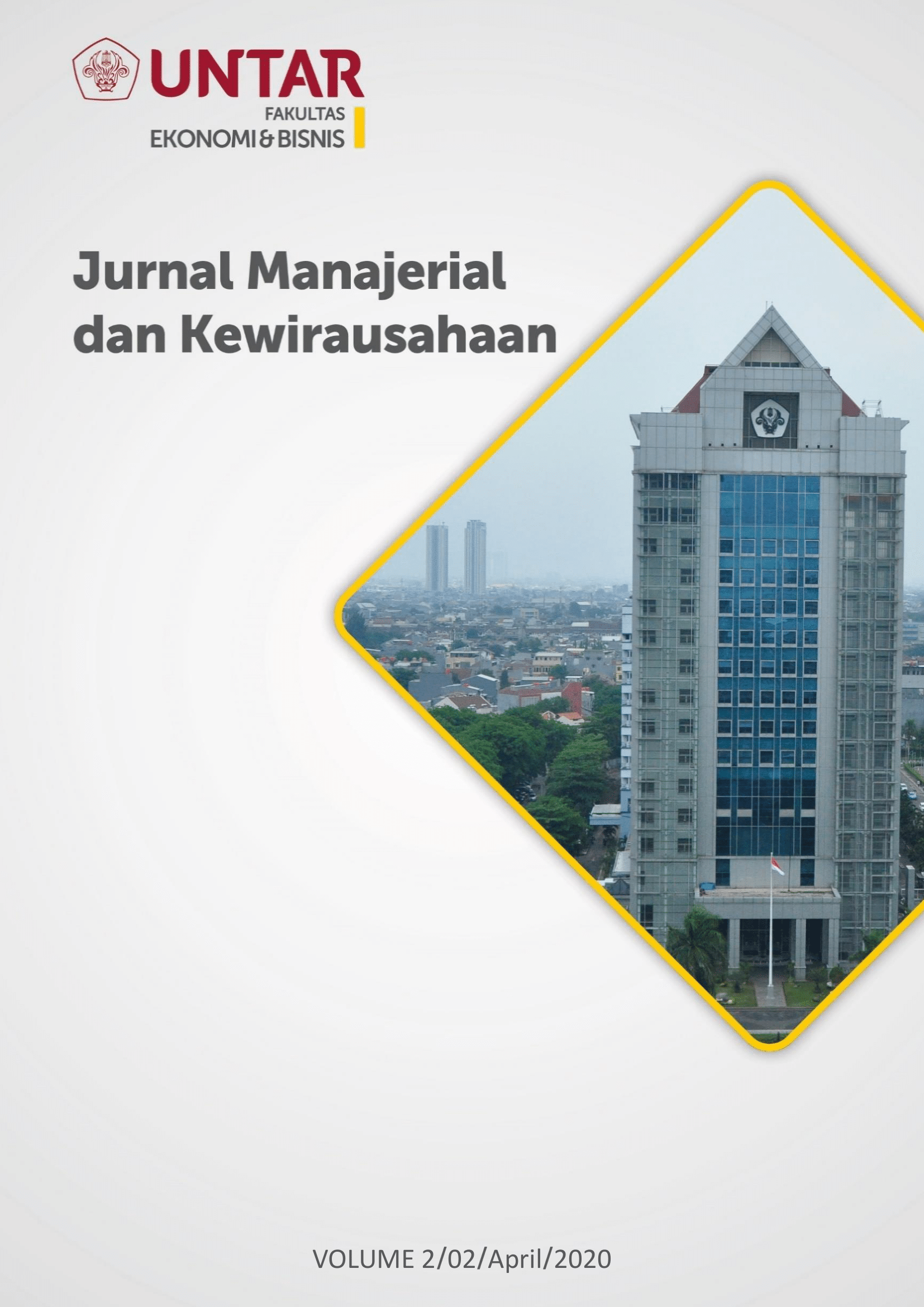Prediksi Brand Experience Dan Perceived Quality Terhadap Brand Loyalty: Brand Trust Sebagai Variabel Mediasi
Main Article Content
Abstract
The purpose of this research is to examine whether 1) brand experience can predict brand loyalty. 2) perceived quality can predict brand loyalty. 3) brand experience can predict brand trust. 4) brand trust can predict brand loyalty. 5) brand trust mediates the prediction brand experience on brand loyalty. Sample was selected using convenience sampling method amounted to 150 respondents. The result of this study show that brand experience has significant effect to predict brand loyalty, brand experience has significant effect to predict brand trust, perceived quality and brand trust have significant effect to predict brand loyalty, and brand trust mediates the prediction of brand experience on brand loyalty.
Tujuan dari penelitian ini adalah untuk menguji apakah 1) pengalaman merek dapat memprediksi loyalitas merek. 2) persepsi kualitas dapat memprediksi loyalitas merek. 3) pengalaman merek dapat memprediksi kepercayaan merek. 4) kepercayaan merek dapat memprediksi loyalitas merek. 5) kepercayaan merek memediasi prediksi pengalaman merek pada loyalitas merek. Sampel dipilih menggunakan metode convenience sampling berjumlah 150 responden. Hasil penelitian ini menunjukkan bahwa pengalaman merek memiliki pengaruh signifikan untuk memprediksi loyalitas merek, pengalaman merek memiliki pengaruh signifikan untuk memprediksi kepercayaan merek persepsi kualitas dan kepercayaan merek memiliki pengaruh signifikan untuk memprediksi loyalitas merek, dan kepercayaan merek memediasi prediksi pengalaman merek pada loyalitas merek.
Article Details
This work is licensed under a Jurnal Muara Ilmu Ekonomi dan Bisnis Creative Commons Attribution-ShareAlike 4.0 International License.,/p>
References
Aaker, D. A. (1991). Managing Brand Equity: Capitalizing on the Value of a Brand Name. The Free Press, New York, NY.
Alloza, A. (2008). Brand engagement and brand experience at BBVA, the transformation of a 150 years old company. Corporate Reputation Review, Vol. 11, No. 4, pp. 371- 379.
Brakus, J., Schmitt, B. and Zarantonello, L. (2009). Brand experience: what is it? how is it measured? does it affect loyalty? Journal of Marketing, Vol. 73, No. 3, pp. 52-68.
Chaudhuri, A. and Holbrook, M. B. (2001). The chain of effects from brand trust and brand affect to brand performance: the role of brand loyalty. Journal of Marketing, Vol. 65, No. 2, pp. 81-93.
Delgado-Ballester, E. and Munuera-Alemán, J. L. (2001). Brand trust in the context of consumer loyalty. European Journal of Marketing, Vol. 35, Nos 11/12, pp. 1238-1258.
Garbarino, E. and Strahilevitz, M. (2004). Gender differences in the perceived risk of buying online and the effects of receiving a site recommendation. Journal of Business Research, Vol. 57, No. 7, pp. 768-775.
Ha, H. Y. (2004). Factors influencing consumer perceptions of brand trust online. Journal of Product & Brand Management, Vol. 13, No. 5, pp. 329-342.
Ha, H. Y. and Perks, H. (2005). Effects of consumer perceptions of brand experience on the web: brand familiarity, satisfaction and brand trust. Journal of Consumer Behaviour, Vol. 4, No. 6, pp. 438-452.
Highlight media. (2018). Simak Kisah Sukses H&M, Fashion Brand Terkemuka Asal Swedia. https://highlight.id/kisah-cerita-sejarah-asal-usul-perusahaan-merekbranded-fashion-h-and-m-swedia/
Kompas. (2018). Manfaatkan Kanal Online Penjualan H&M Melonjak. https://ekonomi.kompas.com/read/2018/09/28/071236826/manfaatkan-kanal-onlinepenjualan-hm-melonjak
Koufaris, M., Kambil, A. and LaBarbera, A. (2002). Consumer behavior in web-based commerce: an empirical study. International Journal of Electronic Commerce, Vol. 6, No. 2, pp. 115-138.
Liu, Y. (2007). The long-term impact of loyalty programs on consumer purchase behavior and loyalty. Journal of Marketing, 71 (4), pp. 19-35.
Michell, P., King, J. and Reast, J. (2001). Brand values related to industrial products. Industrial Marketing Management, Vol. 30, No. 5, pp. 415-425.
Morgan-Thomas, A. and Veloutsou, C. (2013). Beyond technology acceptance: brand relationships and online brand experience. Journal of Business Research, Vol. 66, No. 1, pp. 21-27.
Netemeyer, R. G., Krishnan, B., Pullig, C., Wang, G., Yagci, M., Dean, D., Ricks, J. and Wirth, F. (2004). Developing and validating measures of facets of customer-based brand equity. Journal of Business Research, Vol. 57, No. l2, pp. 209-224.
Oliver, R. L. (1999). Whence consumer loyalty? The Journal of Marketing, 63, Special Issue, pp. 33-44.
Rempel, J. K., Holmes, J. G. and Zanna, M. P. (1985). Trust in close relationships. Journal of Personality and Social Psychology, Vol. 49, No. 1, pp. 95-112.
Rousseau, D. M., Sitkin, S., Burt, R. S., & Camerer, C. F. (1998). Not So Different After All: a Cross-discipline View of Trust. Academy of Management Review, Vol. 23, No. 3, pp. 393–404.
Sharp, B. (1996). Brand equity and market-based assets of professional service firms. Journal of Professional Services Marketing, Vol. 13, No. 1, pp. 3-13.
Zeithaml, V. A. (1988). Consumer perceptions of price, quality, and value: a means-end model and synthesis of evidence. Journal of Marketing, Vol. 52, No. 3, pp. 2-22.



